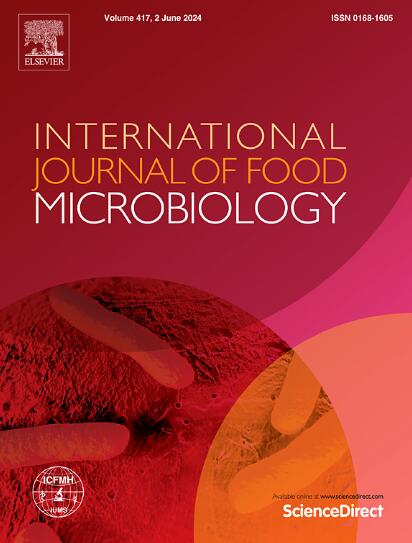Lactic acid bacteria fermentation: A novel and promising pathway to lower the uric acid production of seaweed food (Porphyra haitanensis)
IF 5.2
1区 农林科学
Q1 FOOD SCIENCE & TECHNOLOGY
International journal of food microbiology
Pub Date : 2025-05-20
DOI:10.1016/j.ijfoodmicro.2025.111277
引用次数: 0
Abstract
Porphyra haitanensis is a highly nutritious and widely consumed seaweed food. However, it is a high-purine food, which can increase the risk of disease for individuals with hyperuricemia. To address this issue, three lactic acid bacteria strains, including Lactiplantibacillus plantarum, Lacticaseibacillus paracasei, and Lacticaseibacillus rhamnosus, are utilized to investigate the effects of fermentation on Porphyra haitanensis to reduce the purine content and the activity of xanthine oxidase (XOD) and adenosine deaminase (ADA). All the three lactic acid bacteria strains can significantly reduce in xanthine content and effectively inhibit ADA and XOD activities. The xanthine content can be reduced by 47.80 % after Lactiplantibacillus plantarum fermentation. The inhibition ratio of XOD in Lacticaseibacillus rhamnosus fermentation is as high as to 91.39 %, which is improved by 308.30 %. The inhibition ratio of ADA can be improved by 515.35 % after Lactiplantibacillus plantarum fermentation. Metabolomic analysis is applied to elucidate the key metabolites associated with activity inhibition and molecular docking is performed to reveal the inhibition mechanisms. Folic acid and cis-zeatin were identified as key differential metabolites for the inhibition of XOD and ADA activities, exhibiting strong binding affinities toward both of the two enzymes. This is among the first known reports that the lactic acid bacteria fermentation is utilized to lower the uric acid production of seaweed Porphyra haitanensi. These findings highlight the potential of lactic acid bacteria fermentation as an effective strategy for reducing purine levels in seaweed-derived functional foods, providing novel dietary interventions for hyperuricemia management.
乳酸菌发酵:一种降低海藻食物尿酸产量的新途径
海地紫菜是一种营养丰富、被广泛食用的海藻食品。然而,它是一种高嘌呤食物,会增加高尿酸血症患者的患病风险。为了解决这一问题,利用植物乳杆菌、副干酪乳杆菌和鼠李糖乳杆菌3株乳酸菌,研究了发酵对海紫菜嘌呤含量以及黄嘌呤氧化酶(XOD)和腺苷脱氨酶(ADA)活性的影响。3株乳酸菌均能显著降低黄嘌呤含量,有效抑制ADA和XOD活性。经植物乳杆菌发酵后,黄嘌呤含量可降低47.80%。在鼠李糖乳杆菌发酵过程中,对XOD的抑制率高达91.39%,提高了308.30%。经植物乳杆菌发酵后,ADA的抑制率可提高515.35%。通过代谢组学分析阐明与活性抑制相关的关键代谢物,通过分子对接揭示抑制机制。叶酸和顺式玉米素被确定为抑制XOD和ADA活性的关键差异代谢物,对这两种酶都表现出很强的结合亲和力。这是首次报道利用乳酸菌发酵来降低海地紫菜的尿酸产量。这些发现强调了乳酸菌发酵作为降低海藻衍生功能食品中嘌呤水平的有效策略的潜力,为高尿酸血症的管理提供了新的饮食干预措施。
本文章由计算机程序翻译,如有差异,请以英文原文为准。
求助全文
约1分钟内获得全文
求助全文
来源期刊
CiteScore
10.40
自引率
5.60%
发文量
322
审稿时长
65 days
期刊介绍:
The International Journal of Food Microbiology publishes papers dealing with all aspects of food microbiology. Articles must present information that is novel, has high impact and interest, and is of high scientific quality. They should provide scientific or technological advancement in the specific field of interest of the journal and enhance its strong international reputation. Preliminary or confirmatory results as well as contributions not strictly related to food microbiology will not be considered for publication.

 求助内容:
求助内容: 应助结果提醒方式:
应助结果提醒方式:


